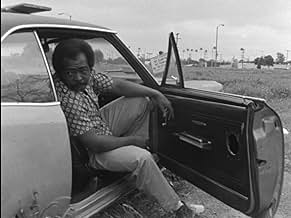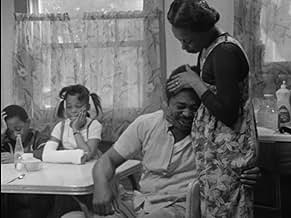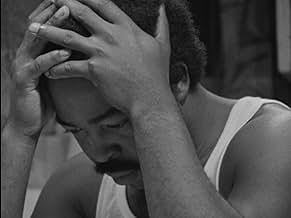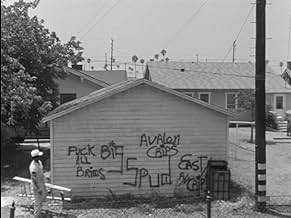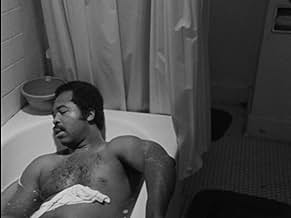Füge eine Handlung in deiner Sprache hinzuA dramatic look into the life of a family in Watts.A dramatic look into the life of a family in Watts.A dramatic look into the life of a family in Watts.
- Auszeichnungen
- 4 wins total
Empfohlene Bewertungen
10tRiVi8L
Woodberry, part of the (UCLA) Film Rebellion movement along with other colleagues such as Julie Dash, constructed this documentary-like saga of life in South Central, L.A. during the early `80s. Showing an uncommon (especially at the time) subject through an avant-garde/foreign (brazilian and cuban) style comes off grandly as part of the Rebellion movement .... showing all of us that mainstream cinema doesn't (and cannot) handle every aspect of film. An extremely different, unsentimental, and pleasant experience.
This film brings back so many memories of my childhood...it is for me, poignant, as I remember how we struggled growing up in Compton-the poverty, the infidelity, the arguments...all were a part of everyday life for us.
I love that it's filmed in black and white. The way the mother fusses and the children, the infrequent shows of affection are powerful...the father's tendency to want to escape while the mother stays focused (even as the friend encourages her to cheat)-all so excellently portrayed by the actors.
I was curious as to what happened to the actors. I couldn't find anything on Nate Hardman but I did learn that Kaycee Moore passed away in 2021.
I love that it's filmed in black and white. The way the mother fusses and the children, the infrequent shows of affection are powerful...the father's tendency to want to escape while the mother stays focused (even as the friend encourages her to cheat)-all so excellently portrayed by the actors.
I was curious as to what happened to the actors. I couldn't find anything on Nate Hardman but I did learn that Kaycee Moore passed away in 2021.
"Well if you can see what I'm going through, why are doing this to me?"
This is a rather somber film about a black family in Los Angeles struggling because the father can't find steady work, and it succeeds because of its simple honesty and realism. It doesn't rely on plot devices aimed at garnering pity, and it doesn't create needless melodrama. We simply see these characters for who they are, a man with a growing sense of emasculation by the world, and his wife who is struggling to do everything around the house with their kids and keep the family afloat. Things come to head when she realizes that he's been seeing an old girlfriend, and not bringing all of the money he does earn home to his family.
The 9-minute argument the two have in the kitchen at that point is easily the highlight of the film. Kaycee Moore is simply fantastic in this scene, and is such a natural at channeling the frustrations and anger of her character. It's a performance that I wish was more widely known and recognized ("I'm tired!"). It's also wonderful that we see quite a bit of her character's point of view in this film, as someone who works, cleans the house, manages the finances, and is as supportive as possible to her husband.
Nate Hardman is also solid as the husband, and it's to the film's credit that he's not a completely virtuous character and we have conflicting feelings about him. In addition to the big moments, we see how small frustrations and the economic pressure boil over in his relationship with his kids and wife. The supporting performances are quite as good as well, most notably the uncredited barber who gives him pragmatic advice about getting a job, which felt completely authentic. The direction from Billy Woodberry in what was his master's thesis at UCLA (wow!) is wonderfully restrained, and it's a damn shame that he had so few opportunities after this debut.
This is a rather somber film about a black family in Los Angeles struggling because the father can't find steady work, and it succeeds because of its simple honesty and realism. It doesn't rely on plot devices aimed at garnering pity, and it doesn't create needless melodrama. We simply see these characters for who they are, a man with a growing sense of emasculation by the world, and his wife who is struggling to do everything around the house with their kids and keep the family afloat. Things come to head when she realizes that he's been seeing an old girlfriend, and not bringing all of the money he does earn home to his family.
The 9-minute argument the two have in the kitchen at that point is easily the highlight of the film. Kaycee Moore is simply fantastic in this scene, and is such a natural at channeling the frustrations and anger of her character. It's a performance that I wish was more widely known and recognized ("I'm tired!"). It's also wonderful that we see quite a bit of her character's point of view in this film, as someone who works, cleans the house, manages the finances, and is as supportive as possible to her husband.
Nate Hardman is also solid as the husband, and it's to the film's credit that he's not a completely virtuous character and we have conflicting feelings about him. In addition to the big moments, we see how small frustrations and the economic pressure boil over in his relationship with his kids and wife. The supporting performances are quite as good as well, most notably the uncredited barber who gives him pragmatic advice about getting a job, which felt completely authentic. The direction from Billy Woodberry in what was his master's thesis at UCLA (wow!) is wonderfully restrained, and it's a damn shame that he had so few opportunities after this debut.
I join with my three IMDB colleagues (there should be more!) in lauding this 80s LA kitchen sink drama about the corrosive effects of joblessness and poverty on a black family and marriage. Most of the things I like about this gritty, grainy work are covered by the previous reviewers, especially the always cogent gbill-74877. I would add that I admire the choice that director Billy Woodberry and writer/cinematographer Charles Burnett make to depict fecklessness from within rather than racism from without to be the main adversary this embattled family faces. And I would note that Woodberry at thirty four and in his first film shows a compassion toward his characters that many more experienced and older directors should envy.
Is there a flaw? Unfortunately, yes, and in my opinion it lies within Burnett's screenplay. It is not that the story is too "thin". There is nothing wrong with soft peddling plot to emphasize character, especially when the characters are played by such compelling actors as Kaycee Moore and Nate Hardman (especially the former). However, there is simply too much padding and filler in this film, too many scenes where not much is going on, like Hardman's character shaving and repairing his fishing line, that serve to bring the pace and flow to a thudding halt and that is never, in my view, a good thing.
Bottom line: Agree with gbill that it's a tragedy equal to the one portrayed in this film that Woodberry did not get to make more movies. Give this one a B plus.
Is there a flaw? Unfortunately, yes, and in my opinion it lies within Burnett's screenplay. It is not that the story is too "thin". There is nothing wrong with soft peddling plot to emphasize character, especially when the characters are played by such compelling actors as Kaycee Moore and Nate Hardman (especially the former). However, there is simply too much padding and filler in this film, too many scenes where not much is going on, like Hardman's character shaving and repairing his fishing line, that serve to bring the pace and flow to a thudding halt and that is never, in my view, a good thing.
Bottom line: Agree with gbill that it's a tragedy equal to the one portrayed in this film that Woodberry did not get to make more movies. Give this one a B plus.
There's an almost documentary feel to this short drama that follows the "Banks" family who are struggling to make ends meet. That's basically because husband/father "Charlie" (Nate Hardman) is habitually unemployed. This puts the strains on his wife "Andais" (Kaycee Moore) and their relationship whilst he imposes a very strict, masculine, discipline on their three children. There is a real paucity of dialogue in this as the intimately photographed imagery is left to show us the relentless mundanity of their lives. "Charlie" is not a nasty or violent man, but he is set in his ways and has no intention of straying from his own path - however inconsistent that may be with would be employers or his children who are, slowly but surely, beginning to show traits of adulthood and choice that he doesn't especially like. He is also not averse to playing on the other side of the blanket. There's a complex relationship going on here between the couple and Moore plays her part strongly. "Andais" is frustrated and disappointed with their lot in life, but is stoic enough to lose her temper but occasionally with a "Charlie" that she clearly loves, but finds exasperating at times. It's an observation of a snippet from their timeline. We join mid-flow and we leave in a similarly inconclusive fashion which, again, adds some realism to this depiction of life for an African American man whose predicaments and options are exclusively made on what he sees are his own terms.
Wusstest du schon
- WissenswertesIn 2013, this film was selected by the Library of Congress for preservation in the United States National Film Registry for being "culturally, historically, or aesthetically significant".
- VerbindungenFeatured in Los Angeles Plays Itself (2003)
Top-Auswahl
Melde dich zum Bewerten an und greife auf die Watchlist für personalisierte Empfehlungen zu.
Details
- Laufzeit1 Stunde 20 Minuten
- Farbe
- Sound-Mix
Zu dieser Seite beitragen
Bearbeitung vorschlagen oder fehlenden Inhalt hinzufügen

Oberste Lücke
By what name was Bless Their Little Hearts (1983) officially released in Canada in English?
Antwort

